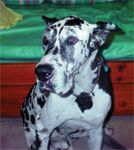About a dog
One doctor talks about the patient that was hardest to lose.
We euthanized Bruno today. Perhaps there are nicer, softer euphemisms. "Put to sleep," for example. But veterinarians are supposed to maintain a professional perspective and communicate using medically correct, unemotional terminology.
Perhaps stoicism does allow for medically correct treatments. But I find that life doesn't always follow proper professional guidelines. And every so often, a patient comes along that makes it difficult to remain emotionally insulated.
This special pet or family breaks through that professional barrier and squeezes your heart, allowing pent up emotions to come pouring out. Times like these should serve as a personal reminder that even caregivers are allowed to grieve—and that it's OK to react to these emotions. Patients like these remind us why we entered the profession. Bruno was one such case.
The patient
He was a big, beautiful Harlequin Great Dane. At one point he'd been a professional model of sorts, and his pictures still adorn the box covers of certain electronic dog products. This past year he even appeared in a commercial for a new pet food.

Bruno, a Harlequin Great Dane, suffered from muscular atrophy. (Photo by Dr. Rosi Cedeno-Stone)
Medically there was nothing particularly remarkable about his pathology, especially for his breed. He was a 9-year-old Great Dane with the usual problems—a history of hip dysplasia, spondylosis, gradual posterior paresis, and limb atrophy. The last year he took a variety of analgesics, anti-inflammatories, and supplements; accepted diet changes; and underwent physical therapy, including both active and passive modalities. The time had finally come when he was no longer able to move his rear legs, suffering marked muscular atrophy and pain.
Bruno suffered his indignities in silence and never ceased to ask for or to demonstrate affection, regardless of his discomfort. He was dignified to the end. He fought to enjoy life, even if it meant running the fence line or chasing horses using the last of his front-end strength in order to compensate for weak hindquarter support.
His family included two little girls, both under 12 years old, and a mother whose day was filled with his company while everyone else was at work or school. The children had no memories of life without Bruno. They bravely accepted the inevitable. But I knew that once he was gone, the reality would set in and his loss would affect each of them a little differently.
Lessons learned
You can't avoid the feeling of emptiness created when a pet leaves home for good. Every corner has a memory, and the opening of a door seems strange when not accompanied by a bark or a wagging tail. There's a missing presence that's palpable.
At these times, I often talk about a lifetime of laughter with only moments of tears. And I hope these words ease the burden. But I know they don't truly diminish my clients' pain. Only time heals all wounds and that's the one thing we can't provide. There's no quick fix for the loss of a companion, a guardian, a friend.
Of course, as a veterinarian, you understand the stages of grief, the disbelief, guilt, anger, frustration, and depression. We all know deep down that eventually people find resolution to their sorrow. But the heart doesn't always respond to what the brain supposedly understands.
Almost as soon as Bruno was euthanized, our practice had to triage a dog hit by a car, a Doberman with a rattlesnake bite, and a Shih-Tzu with a proptosed eye. Keeping busy might be one way to avoid facing life's difficulties, but sad images and heartaches don't go away. They just lie dormant in the back of the mind, waiting for an unexpected moment of solitude so they can rush to the surface.
I had visions of a sobbing housewife staring at a vacant pet bed. Two sisters unable to play together for fear of accidentally making each other sadder.
There seems to be an expectation that fathers remain strong, serving as emotional pillars to support the rest of the family in times of stress. But fathers have memories, too—roughhousing with the pet in the study, a soft nose and a warm head resting on a lap while watching late-night television, a confidant to share secrets with. Fathers feel the loss as well. They feel just as much. But they often suffer in silence.
Dogs and cats spend their lives protecting their families, offering comfort, companionship, and more often than not, entertainment. And if we could talk to our pets about the pain of losing them, I feel certain they wouldn't want the moment of their passing to be the antithesis of their lives.
They wouldn't want us to feel sad or to grieve. They would want us to celebrate their lives and the good times shared. Believing this might be some comfort, but it doesn't ease the loneliness or the sense of loss.
I'm glad that as a veterinarian I was able to end Bruno's suffering and that I helped make his passing peaceful. He reminded me of all the good we do as professionals, how little control we truly exercise, and why I've spent 27 years as a veterinarian and still look forward to more years of practice.
He also reminded me that while nine years may seem like a long life, it's just a moment. I'll miss Bruno. His life touched us all. My wife, my kids, me. He was our companion, guardian, and friend. He was family.
Web exclusive
To read Dr. Stone's protocols for helping clients cope with euthanasia visit www.vetecon.com.
Dr. Ronald W. Stone is the owner of The Veterinary Trauma Center in Groveland, Fla. Please send comments or questions to ve@advanstar.com.